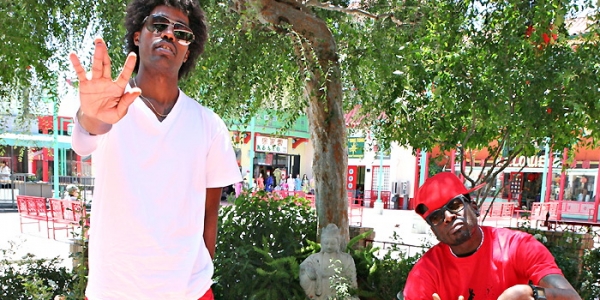I once remember watching an interview on YouTube with The Pharcyde, where a much younger Imani told his audiences, “Yo! My name is Imani. And I do what I wanna do!” Not much has changed, and with twenty years of extra experience tucked neatly under his belt, his assertive and enthusiastic nature has only been amplified. A much more softly spoken Bootie Brown proves the duo to be dichotomous, but complimentary as testified by the two-decade long career together.
“No one can do you like you do you,” Imani says, when asked how The Pharcyde developed their idiosyncratic aesthetic. “We didn’t have to develop it. No one else can be The Pharcyde if you do you.” Bootie adds, “I hated my voice at first. I wanted to sound deep and hard and rap about drugs. I wanted to sound like Rakim but these are the cards you’re dealt with. And it worked in the long run.”
The helium ballooned voices synonymous with The Pharcyde helped produce classics including Passing Me By, Runnin’ and Drop. Twenty years after the release of Bizarre Ride II The Pharcyde, its sense of timelessness is unmistakable and it’s not surprising that it shipped over a million units, garnered comparisons to De La Soul and A Tribe Called Quest, and has had everyone from Pitchfork Media to The Source hailing it as one of the greatest albums ever made.
The album was certified Gold by the RIAA in 1996, four years after its release, however the glowing responses were unexpected for the group. “We had no expectations,” Imani begins. “We wanted to sell enough copies to make another record and we wanted enough people in hip hop to like it. It was a long hard road. In hindsight we can appreciate it, but it was not easy. It was a lot of hard work.”
Despite being an influential ‘alternative’ group, the duo dislike that term, or categorising for that matter. “The industry was dictating what people thought about L.A. at the time,” says Bootie, while commenting on the alternative scene that was thriving in the West Coast amidst gangsta-rap’s popularity. “Everybody out here didn‘t just have jerry curls,” Imani says. “L.A. was a diverse scene. We were dancing dudes that liked to kick it with girls. We were influenced by our lifestyles.” Bootie adds, “There’s so much more out there, aside from what the radio dictates. There are so many different genres of hip hop and rap. [What made people think we were alternative] is that no one was throwing our music any money. [For people to invest] they knew it was gonna be a gamble [and were thinking], ‘I don’t know what this is, or what’s gonna come out of it, but I’m gonna put money in it and see what happens.’”
Originally hip hop dancers, The Pharcyde segued into rap after people began commenting on their voices. When asked why they made the switch, Imani quickly responds, “There weren’t too many things with dance and the list was running short. You were either in music videos or dancing behind somebody.” He continues, “One thing led to another and we met someone and he talked about our voices saying we should do some rap music, and then we started making demos. We were hip hop dancers, so we knew all the music. We did talent shows and began there.” Stylistically, Bootie Brown says that their dancing background has influenced the way that they rap. “The breaths that you take, when you’re writing, you’re forming it around the beat,” he says.
Twenty years is a primed canvas for the highs and lows of group relationships, which resulted in a break-up with the original members. During the late ‘90s and early naughties Slimkid3 and Fatlip left the group, however Imani and Bootie still carry the group name, continuing to busy themselves in new projects.
Their catalogue of impressive collaborations includes director Spike Jonze (Being John Malkovich) and the late J Dilla who produced Runnin’. One of the first groups to work with the renowned producer, Bootie explains how they were introduced. “We went out to New York for our second album but J.Swift wasn’t there. All the producers at the time were approaching us with music they had made for us, which isn’t what we wanted and it wasn’t really working. Q-Tip told us he met this guy in Detroit and said we should peep him out. We listened to three tracks, none of which were over a minute or two. The label wasn’t happy, but we liked it.” But when asked if they could collaborate with anyone, Imani replies with no hesitation. “Jesus Christ himself,” he laughs. “Ain’t nobody done nothing with him. And he can probably play any instrument too.”
Over a wide spanning career, The Pharcyde remain humble. When asked what their greatest career highlight was they reply, “Being in highschool and saying we want to do this, then to have the ability to actually do it. The whole time is one big highlight.”
BY TAMARA VOGL

